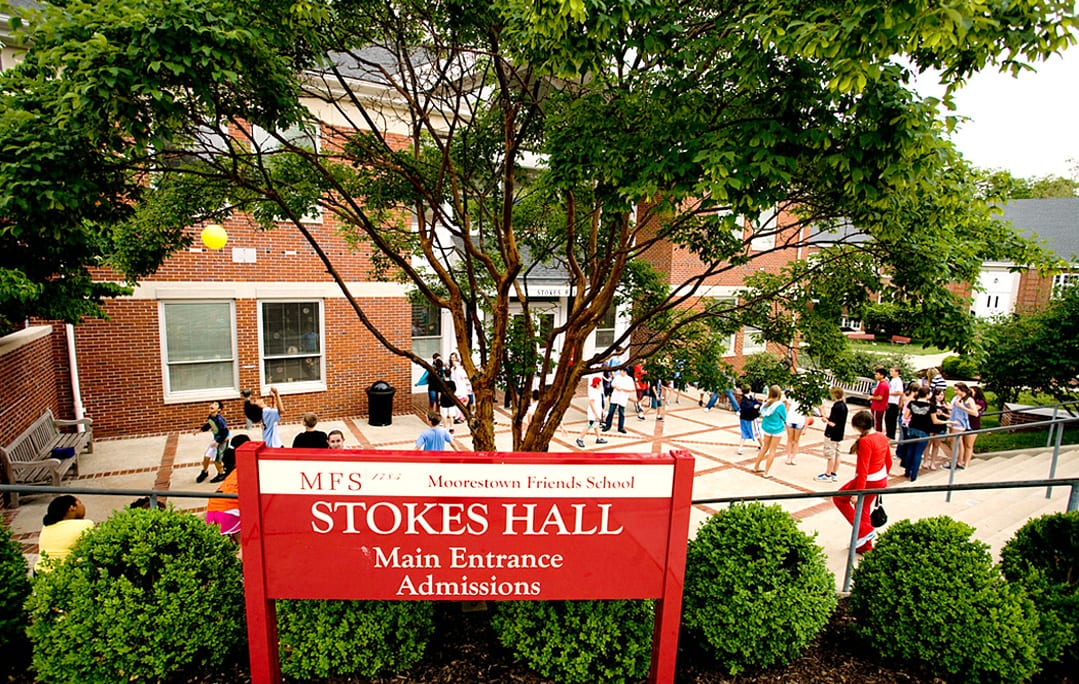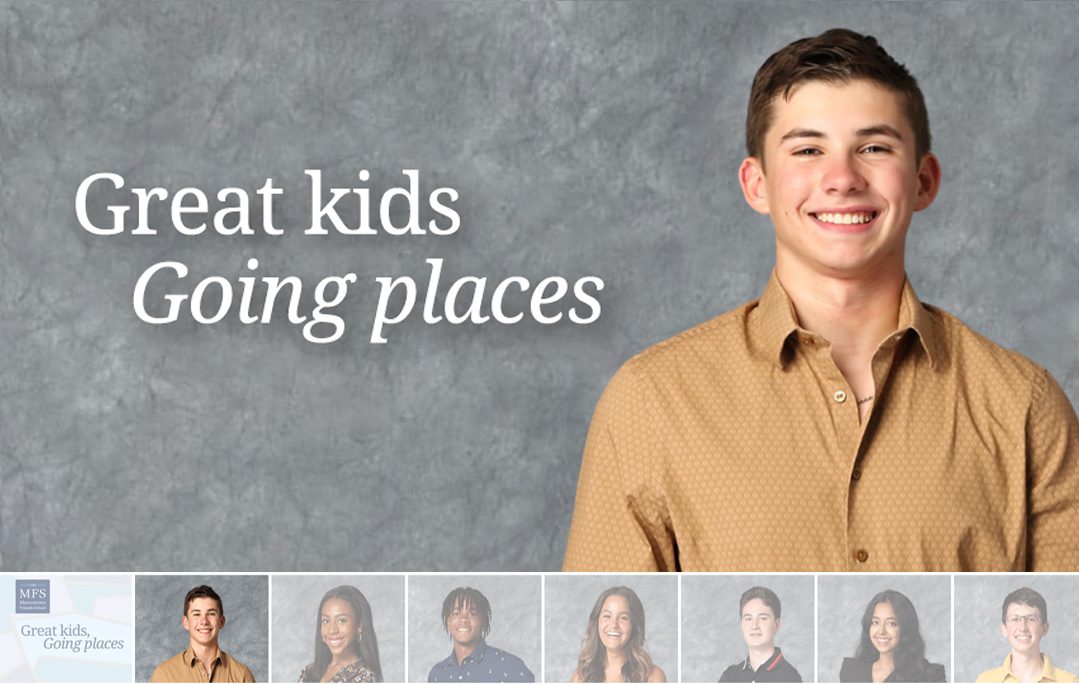Special Area Classes
Each day, our Preschool, Prekindergarten, and Kindergarten students enjoy lessons in at least one of their Special Area classes: Coding, Art, Library, Music, Physical Education, and Quaker Education. Kindergarten also engages in two more classes: Science and Technology. Each of these Special Area classes are taught by full-time specialized teachers who are specifically trained in their areas of expertise. Students will rotate through each Special twice in a six day period.
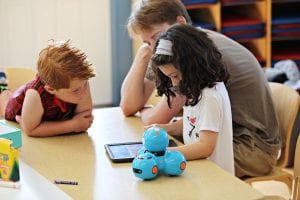 MFS is one of the only schools in the U.S. to offer a Coding program to students beginning in Preschool. This innovative program has three strands: coding, problem-solving, and teamwork. So whether your child becomes a doctor, chemist, theatrical set designer, lawyer, or computer programmer, (s)he will be equipped with valuable computational thinking, problem-solving, and teamwork skills developed from an early age. The goal is to prepare students for a world that is heavily reliant on technology. We are teaching them to understand technology beyond the interface (iPhone, tablet, etc.) level. Our students are going to be able to build, and understand what’s behind, interfaces and interact with technology on a much higher level.
MFS is one of the only schools in the U.S. to offer a Coding program to students beginning in Preschool. This innovative program has three strands: coding, problem-solving, and teamwork. So whether your child becomes a doctor, chemist, theatrical set designer, lawyer, or computer programmer, (s)he will be equipped with valuable computational thinking, problem-solving, and teamwork skills developed from an early age. The goal is to prepare students for a world that is heavily reliant on technology. We are teaching them to understand technology beyond the interface (iPhone, tablet, etc.) level. Our students are going to be able to build, and understand what’s behind, interfaces and interact with technology on a much higher level.
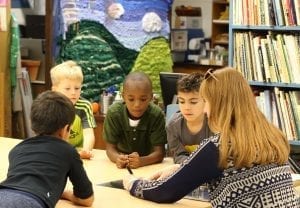 Through our visual arts program, our Beginnings students are exposed to design principles and techniques, the works of professional artists, as well as a multitude of media. Self expression and creative risk taking are encouraged. Students are supported in developing ways to communicate openly about one’s own artistic choices and in appreciating a variety of other styles and preferences.
Through our visual arts program, our Beginnings students are exposed to design principles and techniques, the works of professional artists, as well as a multitude of media. Self expression and creative risk taking are encouraged. Students are supported in developing ways to communicate openly about one’s own artistic choices and in appreciating a variety of other styles and preferences.
Over the course of the program students learn and apply concepts related to pattern, balance, texture, and color theory. There is concentration in the areas of still life drawing, painting, collage building, printmaking, three dimensional sculpture, clay, and weaving. Whenever possible, art class is coordinated with the current theme or study of the classroom.
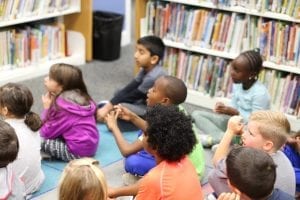 The Beginnings Library program encourages our young students to develop a lifelong love of reading, books and libraries, and lays a strong foundation for students to become effective users and researchers of ideas and information. The librarian works with the classroom and other Special Area teachers to integrate skills and lessons with classroom explorations and activities, and provides a variety of resources for classroom and personal use. Family members of our MFS community also have library borrowing privileges and access to MFS online subscription resources.
The Beginnings Library program encourages our young students to develop a lifelong love of reading, books and libraries, and lays a strong foundation for students to become effective users and researchers of ideas and information. The librarian works with the classroom and other Special Area teachers to integrate skills and lessons with classroom explorations and activities, and provides a variety of resources for classroom and personal use. Family members of our MFS community also have library borrowing privileges and access to MFS online subscription resources.
During library classes, our young students practice many skills to help them become attentive and interactive learners in a small group setting. During the first part of classes, the librarian shares a dynamic selection of classic children’s literature and the newest titles from a variety of genres, both fiction and nonfiction, including some online subscription and digital resources, and an extensive picture book and board book collection. Offering opportunities for students to hear the best in children’s literature, the program presents materials from diverse backgrounds and experiences to inspire the imagination, recognize patterns and make associations, with stories in series, sequels, and variations. In these early grades, the librarian often uses puppets, props, and other play materials to enhance literacy and sorting activities.
Our preschool and prekindergarten students also enjoy some independent browsing in the extensive board book and early childhood picture book collections. Our kindergarteners become independent library users as they begin to select and checkout books. They are introduced to their new responsibilities as users of a library’s shared community resources, such as the proper handling and care of books, as well as classification concepts and the arrangements of materials in libraries. They begin to identify identifying bibliographic information in materials such as titles, authors and illustrators, to inspire them to seek out more resources and to begin learning about bibliographic citations and academic integrity.
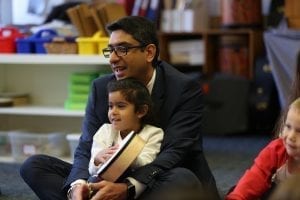 Through singing, chanting, playing instruments, moving, listening, musical games, and learning basic music notation, students develop knowledge about essential musical concepts such as rhythm, pitch, melody and harmony, form, expression, and tempo. Students are actively engaged in the work of musicians by performing, creating, and responding to music. The classroom repertoire is rich and varied. It includes folk songs, music from various countries and cultures, and music that spans from classical through the current day.
Through singing, chanting, playing instruments, moving, listening, musical games, and learning basic music notation, students develop knowledge about essential musical concepts such as rhythm, pitch, melody and harmony, form, expression, and tempo. Students are actively engaged in the work of musicians by performing, creating, and responding to music. The classroom repertoire is rich and varied. It includes folk songs, music from various countries and cultures, and music that spans from classical through the current day.
In all grades students sing, play instruments appropriate to their level of development, listen to many types of music, move to music, and increase their music vocabulary. Students are given the opportunity to perform for others during the course of the year. These performances range from performing for other classes informally or during an assembly, performing for grandparents and special friends on Grandparents’ Day, and presenting our annual Winter and Spring Concerts.
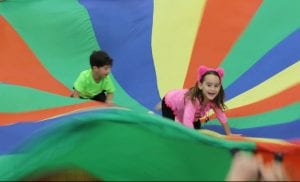 Our goal of our Beginnings PE program is to assist each child in developing attitudes, skills, and knowledge of human movement that will result in a lifetime of participation in physical activity. Lessons are designed to provide maximum participation for all students, increased practice of the focus skill, and a high success rate for each student. The teacher serves as a facilitator, providing the initial task and then assisting individuals as needed.
Our goal of our Beginnings PE program is to assist each child in developing attitudes, skills, and knowledge of human movement that will result in a lifetime of participation in physical activity. Lessons are designed to provide maximum participation for all students, increased practice of the focus skill, and a high success rate for each student. The teacher serves as a facilitator, providing the initial task and then assisting individuals as needed.
Students work on all aspects of physical fitness including increasing cardiovascular efficiency, flexibility, agility, balance and strength/endurance. They develop their ability to follow directions, distinguish left from right, and identify major body parts and how they relate to movement. Research has shown that early childhood physical education improves more than just physical wellness, it also assists and improves mental and emotional development in children.
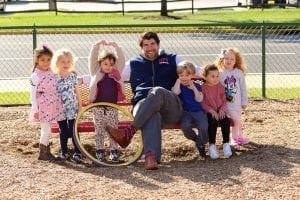 Our founding Quaker values shape every aspect of how our students of all ages relate to their teachers, interact with each other, approach opportunity, exceed expectations, and confront challenges. We find that our enduring principles remain relevant to and resonant with families of all walks of life, cultural backgrounds, and belief systems, especially in a rapidly changing modern world.
Our founding Quaker values shape every aspect of how our students of all ages relate to their teachers, interact with each other, approach opportunity, exceed expectations, and confront challenges. We find that our enduring principles remain relevant to and resonant with families of all walks of life, cultural backgrounds, and belief systems, especially in a rapidly changing modern world.
Students in our Beginnings program are encouraged to develop empathy, emotional awareness, conflict resolution skills, and religious literacy early on in Quaker Education classes.
Preschool students build on the early stages of conflict resolution by sharing, speaking kindly, expressing how they feel, and waiting their turn. Quaker Education takes place during Centers, a period for preschoolers to build relationships and explore their surroundings through play.
Prekindergarten and Kindergarten students have a 30-minute class period designated for Quaker Education. Every class begins with a moment of silence and stillness so students can bring awareness to the hearts, bodies, and minds. Throughout the school year, students are given the opportunities to practice mindful awareness, learn about the beliefs of others, and prepare for Meeting for Worship.

